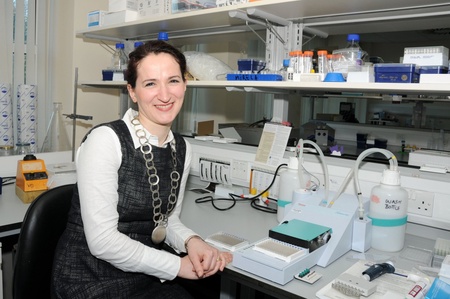Scientists at the University of Aberdeen have demonstrated the further success of a drug previously reported to 'block' fat in the arteries.
Following a landmark 2017 research paper from the Aberdeen Cardiovascular and Diabetes Centre and funded by the BHF, which showed that the drug Trodusquemine could be used to reverse the effects of a build-up of fat inside the arteries of mice, researchers have published new findings demonstrating the same positive results in blood cells from humans.
The initial pre-clinical tests showed that when the drug was given to mice on a high fat diet, it prevented an enzyme called PTP1B from exerting its effects in the body. PTP1B activity contributes to the development of aortic plaque which forms when fat accumulates in the wall of the artery.
PTP1B is often increased in people with obesity and diabetes and conditions involving prolonged inflammation such as sepsis, inflamed diabetic foot ulcers and allergic lung inflammation.
In the latest study, funded by the University of Aberdeen’s Development Trust, researchers tested the success of Trodusquemine, on white blood cells taken from 30 healthy volunteers and 30 volunteers with coronary artery disease and atherosclerosis.
They were able to see the same biochemical changes in the cells taken from people as they did in mice after the use of PTP1B inhibitor.
When PTB1B levels are increased in the body, a series of events occur leading to white blood cells taking up oxidised cholesterol, which then turn them into foamy cells, that lead to fatty deposits within arteries and cause even more inflammation.
Trodusquemine blocked the effects of this immune response preventing the white blood cells, called macrophages, from becoming foam cells, which could explain why this drug prevents the accumulation of fatty deposits.
Researchers also discovered that genetic deletion of PTP1B lowers cholesterol levels and in particular the levels of low-density lipoprotein (LDL, or "bad") cholesterol in mice. They also observed improved communication between cells, which is normally dampened in heart disease.
Professor Mirela Delibegovic, who led the study, said: “Our findings complement the data presented in a previous publication by our lab where a single dose or chronic dosing of Trodusquemine led to a decrease in aortic plaque in preclinical models.
“This could represent a novel therapeutic mechanism to protect against atherosclerosis - the condition that causes most heart attacks and strokes.
“Our initial study was cause for optimism but posed the question ‘is it feasible in humans and do the same changes occur’? Our findings here show the answer is an encouraging ‘yes’.
“We have been able to demonstrate that the drug works through the same mechanisms and reduces “bad” cholesterol so that the build-up of fatty streaks could potentially be overcome.
“This is an important step forward and proof of principle data we required to propose moving towards clinical trials.”
Professor James Leiper, Associate Medical Director at the British Heart Foundation, welcomed the results, saying: “Atherosclerosis is a major cause of morbidity and mortality in the UK and the cause of most heart attacks and strokes.
“The current research builds upon BHF funded research that demonstrated a role for PTP1B in the development of atherosclerosis in mice and demonstrates a similar role in white blood cells isolated from patients.
“This research has identified a potential new therapeutic target for the treatment of atherosclerosis. These are potentially exciting results, but further research will be required to demonstrate the efficacy of PTP1B inhibition in humans.”


